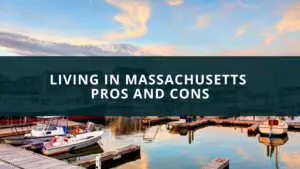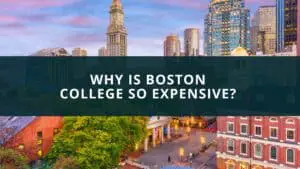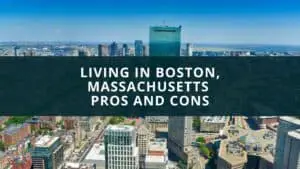Are you thinking of moving to Worcester? Then, you would want to know everything about this city in central Massachusetts and what makes it tick. So, what’re the pros and cons of living in Worcester?
Living in Worcester means you can enjoy the qualities that make it livable such as fun activities, a strong economy, an innovation hub, quality education, and minimal traffic. Still, it’s not without issues. The disadvantages include unsafe areas, unaffordability, extreme weather, and rundown areas.
Despite its blemishes, Worcester is still a pretty great place. It’s the second biggest city in New England and has a rich history as an industrial town. But it’s much more than that. Read on to know more about Worcester.
Quick navigation
Pros of Living in Worcester
- Lots of Activities for Residents
Given that this isn’t Boston, you might be afraid of getting bored in some town in Massachusetts. But Worcester isn’t some small town, and you aren’t getting bored. There are several things to do and various attractions all over the city. Theatres, museums, parks, and lots more are everywhere in the city.
- Healthy Economy
The economy is essential to the quality of life, and the economy is quite great here in Worcester. This isn’t some industrial town past its glory days. It’s a city that has redefined itself. There are several job opportunities, and you can easily get a good one. The unemployment rate in Worcester was 5.6% for June 2021, which is below the national average. Job creation is high here, and the education sector is booming.
However, the median household income in Worcester is $48,139, which is below the national average of $62,843. This shows that despite its robust economy, many residents are still struggling financially. If it’s any consolation, Boston is close by with better pay and opportunities.
- Center of Innovation
The city is home to one of the best technical schools in the United States, which has birthed many innovations. The Worcester Polytechnic Institute specializes in science and technology. Beyond that, the manufacturing sector in Worcester is strong, and inventions from Worcester include a typewriter, rocket fuel, Anti Gravity suit, and lots more.
- Educational Opportunities
There are several schools in this city, giving you the option to attend the best from K-12. Whether you want private or public schools, this city got you covered. Worcester Public Schools is the school district serving the city, and it’s highly rated. There are also various charter schools and science and tech high schools.
Furthermore, the Diocese of Worcester operates a catholic school system in the city. Worcester also has two prep schools which are Bancroft School and Worcester Academy. Higher education options beyond the K-12 options include Clark University, Worcester Polytechnic Institute, Holy Cross College, Becker College, University of Massachusetts medical schools, MHCPS University, and more.
- Minimal Traffic
Unlike nearby Boston, the most congested city in the US, traffic is minimal in Worcester. This is evident in the one-way commute time, which is an average of 24 minutes and lower than the national average. However, the public transit system isn’t the best, as WalkScore gives the city a transit score of 33/100. Biking infrastructure is also minimal here, but you could still be able to ride your bike in some neighborhoods. However, Worcester’s walk score of 56/100 means some errands can be accomplished on foot, and it’s not an entirely car-dependent city.
Cons of Living in Worcester
- Unsafe Environment
The crime rate here is one of the worst for the whole state. This can prove problematic for many people, considering how important safety is when choosing a residential city. The total crime rate is 8% above the national average, and violent crimes are 66% higher. Fortunately, property crimes are lower by 3%, so it’s not all bad news on the security front.
The chances of being a crime victim in Worcester is 1 in 38, but the city is still safer than 14% of cities in the country. However, you can take solace in the fact that crime has been on the decrease for a while now. In addition, there are still several neighborhoods within the city where the crime rate is considerably low.
- Expensive City to Live
Although the cost of living is only slightly above the national average, it’s higher. The cost of living here is 2.2% above the national average. So, if you’re looking for an affordable city in Massachusetts, this isn’t it. What further makes it expensive is the taxes residents will have to pay here.
Worcester’s tax rate is higher than what most cities in Massachusetts normally pay as taxes. Generally, the state income tax is fixed at 5.05% and Sales taxes at 6.25%. This applies throughout the state, and no county can impose its taxes. But counties could impose property taxes. It’s here that the tax rate in Worcester increases substantially. The property taxes in the city is 1.628% for residential properties and 3.62% for commercial properties.
- Extreme Winters and Bad Weather
Once you stay in New England, there’s no way to escape the harsh winters. Thus, you can expect many snow, ice, and chilly storms during the winter in Worcester. You’ll be doing a lot of snow shoveling while at it. Winter storms in Worcester are quite dangerous, and most times, businesses close due to the extreme winds and severe snowfalls.
The spring season isn’t better because with it comes what locals call the Mud season. This occurs between March and April when the thaw turns everything into. Only summers and fall are pretty enjoyable seasons here, and even the summer can get hot on some occasions.
- Rundown Areas
The city has developed itself considerably. But it’s far from perfect. You’ll still find relics of its industrial history in some parts with many abandoned factors. Fortunately, Worcester is working to improve these areas.
In Conclusion
Worcester as a city combines the attributes of an urban center with a small town. Unlike Boston, it’s quiet with little traffic and many other positives. But it has negative features that you, as a potential resident, could be concerned about. By now, you know enough about the city to decide if it’s good for you.




